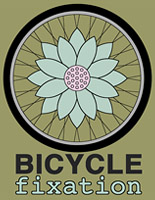[Previous entry: "A Bag of Dirt"] [Next entry: "Another Small Step"]
06/23/2009: "The Pot Calling the Kettle Frivolous"
We had the odd experience on my favorite bicycle forum last night of one of our members referring to bicycling as "frivolous," apparently because it is pleasurable. The presumed corollary was that cars aren't somehow "frivolous," even though the majority of car trips in the US don't involve carrying bulky objects and cover less than two miles.So, I got my rant generator going, and it emitted the following:
Driving is frivolous, [especially] if it is used to cover distances of less than say ten miles, where it is unnecessary, there being a means to cover the same distance in nearly the same time with a far lesser use of resources. This could be bicycling or transit.For a good analysis by an Actual Philosopher that examines the underpinnings of automobility's essential frivolousness, I strongly recommend you read André Gorz's short essay, The Social ideology of the Motorcar.
Bicycling is frivolous for distances of less than a mile, for the same reasons. (And yeah, I walk within my one-mile radius.)
Mobility itself is frivolous if there be the resources you are seeking near at hand.
One big discussion in urban planning circles now is the distinction between "mobility" and "access," and the need to destroy the perception that access is dependent on mobility, which concept has been hammered into us by years of suburban sprawl and a very expensive subsidization of automobility (driving being a heavier drain on the public purse, per mile driven, than fare-supported transit and certainly than bicycling).
You can get the passenger throughput of an eight lane highway with fewer than two lanes if you depend on cycling; you can get 35 lanes of throughput in the space of three lanes with heavy rail--or no lanes, it the heavy rail is underground--but with greater use of energy than bicycling.
The figures, from Worldwatch Institute:
Energy used per passenger-mile (calories):
Auto: 1,860
Bus: 920
Rail: 885
Foot: 100
Bicycle: 35
Of course foot and bike calories come from food, which has less embedded energy (energy used to produce and deliver it) than the oil that fuels cars, buses, and diesel trains. (Electric trains using stationary generation are more efficient; I don't know which propulsion system figures in Worldwatch's numbers.) So the spread, if the the embedded energy of the energy used per mile is added, should be even greater.
According to a Texas DOT study, no road generates more than half its construction and maintenance costs alone in user taxes, and most far less--some returning only 16% of just road costs over a forty-year use life. (And there are many other costs associated with rampant road use--policing, attending to accidents, building feeder roads, along with the loss of property tax income in urban areas, as the roads replace homes, businesses, and services.)
So us frivolous cyclists are subsidizing the far more frivolous lifestyle choices of motorists--with our hard-earned tax dollars. I myself would rather those taxes went towards narrow bike highways, that didn't take up so much of what could be wildland, farmland, squares, schools, and libraries, or tax-paying commercial and residential property, and that would last nearly forever under the light impact of our little vehicles.



